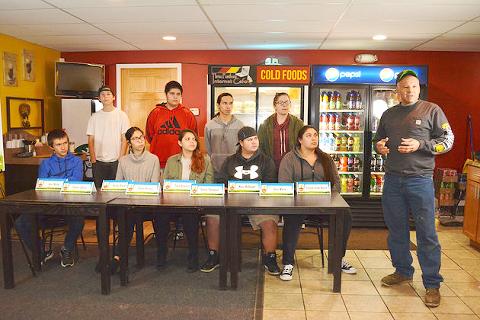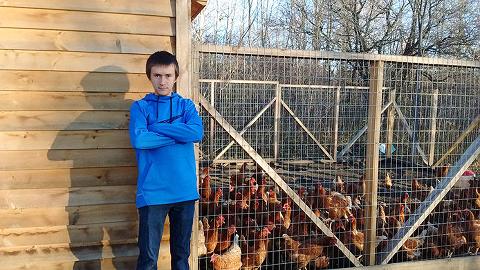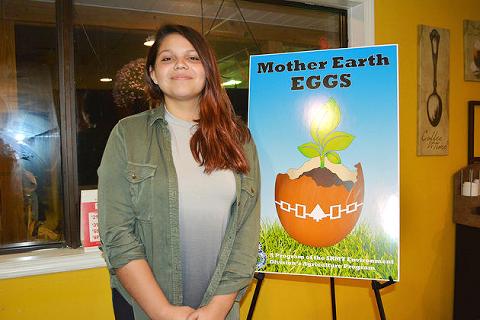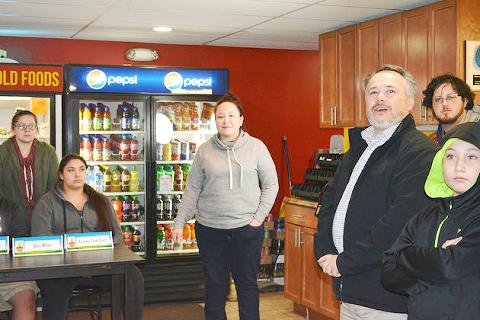 |
Canku Ota
|
 |
|
(Many Paths)
|
||
|
An Online Newsletter
Celebrating Native America
|
||
|
December 2016 - Volume
14 Number 12
|
||
|
|
||
|
Akwesasne Youth Launch
"Mother Earth Eggs" Pilot Project
|
||
|
by Indian Time
|
||
Nine Akwesasne youth recently launched the Mother Earth Egg Pilot Project at the Three Feathers Café on Thursday, November 3, 2016. They include: Tristan Cook-Hasty, Levi Herne, Jheri White, Mose McDonald, Daniel Thompson, Tisha Benedict, Ethan Pervais, Bailee Rourke and Clinton Atkins, all high school students currently attending the Akwesasne Freedom School, Cornwall Collegiate Vocational School, Massena Central School and Salmon River Central School. The Saint Regis Mohawk Tribe's Agriculture Program and the Office of Economic Development are sponsors of the Mother Earth Egg project and hosts of the evening. The Mother Earth Egg Project provided a unique opportunity this past summer for the nine local students in grades 9 to 11. They began with a training program that taught the process and practices involved with producing eggs. The program was conducted during the student's summer break from school and offered at the Tribe's Environment Division Boardroom, with instruction continuing throughout the fall with one-hour weekly sessions hosted on Thursday evenings. During the press conference the Akwesasne youth shared their experiences in raising chickens and producing eggs for sale to local restaurants, businesses and to the local consumer as more and more Akwesasronon have become aware and concerned over the food they consume. Providing locally produced, organic and hormone free eggs are one step in reaching food sustainability and food sovereignty. Office of Economic Development Director Christopher Thompson said, "We are putting future food production in the hands of our youth who will lead us into self-sufficiency. The experience and skills learned through this process are invaluable and will provide youth with the tools to succeed." Agriculture Program Manager Wallace Ransom added, "Our goal is to teach local youth how to raise and care for a flock of chickens, with the hope of having them earn money from their hard work for the eggs they produce. It's part of our program's effort to increase understanding of agricultural production and promoting a healthy lifestyle through locally grown produce. It's a pilot project, so we plan to make improvements and offer this opportunity to more youth in the near future." After the students completed their summer training session, the Agriculture Program staff helped construct chicken coops at each student's home. Each student received upwards of 100 chickens. They were also supplied with feed and materials necessary to maintain them. Once the chickens arrived, further instruction was provided as their individual flocks began laying eggs this past month, with some student's experiencing a daily production of 60 to 70 eggs. Levi Herne, one of the first youth to participate in the project, was raising over 180 chickens at one time while waiting for other students to finish their training. With past experience raising pigs, Herne shared the gainful experience with his fellow students. Overall production is currently estimated at 60-dozen eggs a day for the project's initial weeks, but is projected to be up to 400-dozen once maximum production is achieved later this month. At that point, the students hope to market their products to local restaurants and to make them available for purchase at local stores, hopefully beyond the Akwesasne community. The students themselves named their product "Mother Earth Eggs," with Three Feathers Internet Café Owner Valene Gray being the very first Akwesasne business to place an order for 30-dozen eggs. "This is a wonderful opportunity for students to learn all aspects of taking a product from farm to market, as well as for local business looking for fresh produce," said Valene Gray. She noted, "For restaurants, fresh eggs have reduced the amount of time required to cook and prepare orders, which generates into increased sales. More and more customers are concerned about the quality and origins of what they are eating and providing farm fresh, organic eggs is perfect!" Be sure to look for "Mother Earth Eggs" coming to a grocery store or being served at a restaurant near you. |
|||||||||||
|
|
|
|
||
|
|
||
| Canku Ota is a free Newsletter celebrating Native America, its traditions and accomplishments . We do not provide subscriber or visitor names to anyone. Some articles presented in Canku Ota may contain copyright material. We have received appropriate permissions for republishing any articles. Material appearing here is distributed without profit or monetary gain to those who have expressed an interest. This is in accordance with Title 17 U.S.C. Section 107. | ||
|
Canku Ota is a copyright ©
2000 - 2016 of Vicki Williams Barry and Paul Barry.
|
||
 |
 |
|
|
The "Canku
Ota - A Newsletter Celebrating Native America" web site and
its design is the
|
||
|
Copyright ©
1999 - 2016 of Paul C. Barry.
|
||
|
All Rights Reserved.
|
||



